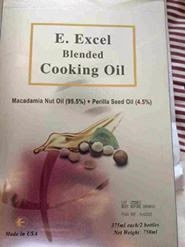Lately has been a lot of articles on unhealthy cooking oil. Cooking oil used easily lead to inflammation given that Omega 6 is too high.
So how to select healthy cooking oil. What are points to take note?
1. Smoke point
Each oil has its smoke point.
Smoke points means that once the temperature of the oil is reached, the oil starts to break down and smoke, producing toxic, or even carcinogenic substances.
According to Taiwan Food and Drug Administration, Ministry of Health and Welfare states "Cooking oils must not be used to the point where they exceed their smoke points, or
oxidization will cause them to become rancid and produce large amounts of harmful free radicals and polymers".
The cooking temperatures of common Asian cooking methods like stir frying in high heat or deep frying can be as high as 190 degree. Take for example, highly recommended olive oil, with the smoke point of 160 degree, olive oil is unsuitable for cooking with strong flames.
Another example is Kiwi fruit seed oil, although it has excellent Omega 6: Omega 3 ratio (1:4), it is also unsuitable for high temperature stir frying as it has a smoke point of 160 degree.
In contrast, Macadamia oil and Perilla seed oil are safer for use with high temperature cooking methods as they have smoke points of over 200 degree.
| Type | Smoke Point
(Degree celcius) |
| Macademia Oil | 210 |
| Perilla Seed
Oil | 202-250 |
| Kiwi Fruit
Seed Oil | 160 |
| Soybean Oil | 160 |
| Olive Oil | 160 |
| Tea Seed Oil | 252 |
| Sunflower Oil | 107 |
| Corn Oil | 160 |
| Sesame Oil | 177 |
| Peanut Oil | 160 |
|
|
|
|
| |
|
|
|
|
|
|
|
|
|
|
|
|
|
|
|
|
|
Depending on extraction methods, oil may have different smoke points. Although refining oil increases the smoke point of oil, toxic components like hexane and heptane may be added during oil extraction.
These organic extraction agents are later removed by distillation, but these harmful components may not be removed completely - residues may remains in the oil.
2. Ratio of Omega 3: Omega 6
Both Omega 6 and Omega 3 fatty acids are necessary for supporting health of our heart, brain and immune system. It's vital that we obtain these important nutrients through our diets.
Modern diets contain large amounts of oil. There is also a general misconception that plant oils are healthy, and can thus be consumed in any amount. As a result, the ratio of omega-6 to omega-3 consumed can often be as high as 30:1. The ideal ratio should be between 1:1 and 4:1.
Consuming too much Omega 6 fatty acids will pose numerous health dangers. Research shows that:
"A high Omega 6: Omega 3 ratio, as is found in today's western diets, promotes the pathogenesis of many diseases, including cardiovascular disease, cancer, osteoporosis and inflammatory and autoimmune diseases."
| Type |
Omega 6: Omega
3 |
| Perilla Seed
Oil |
1 : 4 |
| Kiwi Fruit
Seed Oil |
1 : 4 |
| Macademia Oil |
1 : 1 |
| Canola Oil
(Rapeseed Oil) |
2.1 : 1 |
| Soybean Oil |
7.1 : 1 |
| Olive Oil |
12.8 : 1 |
| Tea Seed Oil |
31.8 : 1 |
| Peanut Oil |
32 : 0 |
| Palm Oil |
45.9 : 1 |
| Corn Oil |
46.1 : 1 |
| Sesame Oil |
137 : 1 |
| Cottonseed
Oil |
259.4 : 1 |
| Grapeseed Oil |
676.1 : 1 |
3. Other tips to select healthy cooking oil
- Use only safe and natural cooking oils. Cooking oil must not contain harmful substances like erucic acid or gassypol. Level of erucic acid in edible oil must not exceed 5%. Consuming erucic acid in large amount may harm the heart by causing myocardial fibrosis. Gossypol may lead to chronic poisoning and effect fertility. Erucic acid is commonly found in canola oil while gossypol is often present in cottonseed oil.
- When cooking dishes that involve high heat stir-frying, select cooking oils that have relatively higher smoke point
- Oil is high calorie regardless of whether it is derived from animal or plant. So be mindful on how much you consume.
We are proud that E.Excel has launched the Blended Cooking oil that mixed Perilla Seed oil and Macademia Oil for healthy reason.
To understand more, view the youtube link!
Can we re use cooking oil
Cheers
Siew Choon
90263064


























